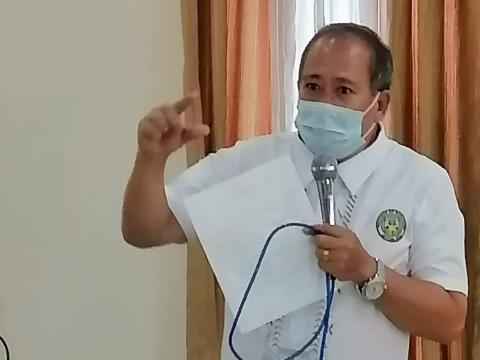SUPPORT TO THE ORGANIC AGRICULTURE PROGRAM – Provincial Agriculturist Engr. Alson G. Quimba emphasizes a point during the training on the Installation of Internal Control System for smallholder groups in the province of Bukidnon. He graced the activity by giving a welcome message to the trainees.
MALAYBALAY CITY, BUKIDNON – To fulfill the basic requirements for organic inspection, and for further organic certification, the installation of the Internal Control System (ICS) is needed especially for smallholder groups of Bukidnon. ICS will be the official “control body” for the smallholder group to make sure that Organic Standards will be properly implemented by each individual member of the group.
From these premises, Agricultural Training Institute – Regional Training Center X (ATI – RTC X) is currently conducting the training on ICS for Smallholders Group at Veranda in Casisang, Malaybalay City, Bukidnon.
The installation of the ICS is a requirement for organic third-party certification. There should be a single organic system plan for the group and that, individual group members use the certification system. Likewise, similar production methods and inputs are used on all farm plots in the group.
Standard inspection protocols are integral for the implementation of ICS. The installation of ICS for smallholder group has many requirements which include (1) written procedures and forms (ICS manual), (2) understanding risk assessment and critical control points, (3) internal organic standards, (4) internal control and approval procedures, (5) organized group structure, (6) human resource training and development schemes and (7) established product protocol, among others.
The training has four Phases. Phase 1 focuses on the installation requirements and comprehensive appreciation of the principles of organic agriculture and the elements of ICS. Phase 2 involves the training of the ICS staff. Phase 3 is the On-the-Job training for members of the ICS. Phase 4 focuses on the evaluation of the ICS. It aims to determine the completion and readiness of the organization for application for certification.
The Office, through its Organic Agriculture Focal Person, Javier Andalan, tapped the expertise of Greenminds, Inc., an accredited private External Service Provider (ESP) of ATI 10 and an expert in Organic Farming. Topics to the training include the Salient points and Relevant Regulations of RA 10068, Philippine National Standards (PNS) on Organic Agriculture, Organic Certification, Smallholder Group Certification, ICS and Steps in Installing, Procedures, Forms and Processes, Internal Report Integration, Internal Approval, ICS Documentation, and a Workshops on the ICS manual, among others.
Many participants have shown interest to join the training but because of the pandemic, they were only limited to twenty-two (22). The majority of them were beneficiaries of the Mindanao Development Authority (MinDA) project who produces organically grown black rice.
In his message during the Opening Ceremony of the training, Bukidnon Provincial Agriculturist Alson G. Quimba emphasized the importance of record keeping. “Mostly sa grupo ang pinaka weak point is recording, recordkeeping, maoy marumbo nga usa sa mga hinungdan sa failure sa group. Mao nga importante kaayo ang data nga gikan sa inyong ICS kay mao ang basis of what are the things to do,” he said. (Mostly, in groups, recording and recordkeeping are the weakest points. It usually bears the cause for the failure of the group. This is the reason why it is important to keep data from your ICS so that we can have the basis of what are the things to do.)
The 5-day training started last August 10, 2020, and will conclude on August 14, 2020. The ATI-RTC X assures the public that proper protocols laid down by the COVID19 Inter-Agency Task Force (IATF) were followed, like social distancing, wearing of face mask, and other protective equipment, if necessary, regular handwashing, and regular temperature check of the participants, among others. (with reports from Javier P. Andalan)

